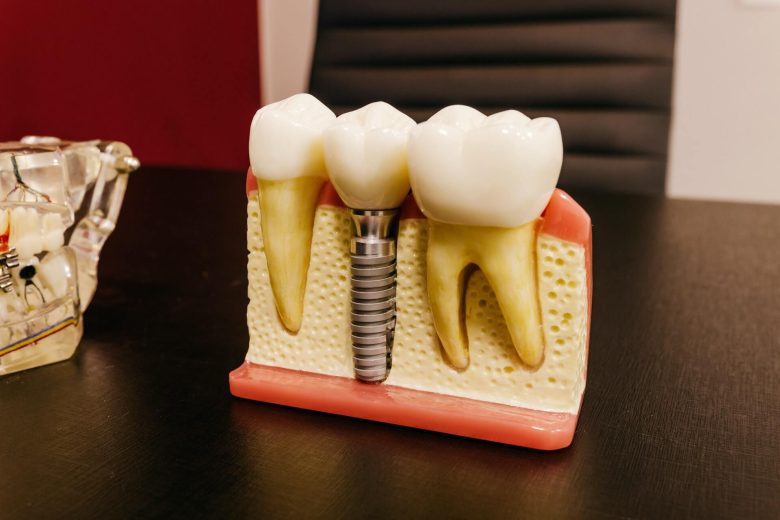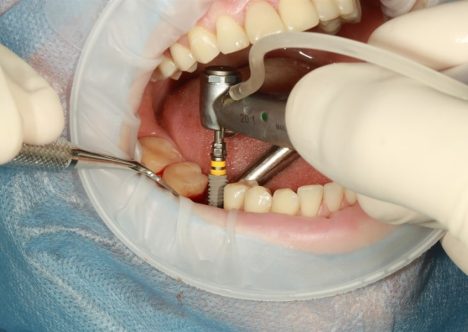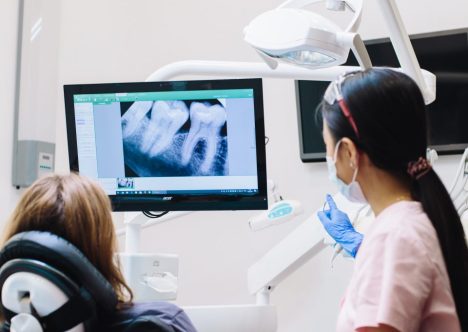Despite advances in dental treatment, millions of Americans experience loss of natural teeth, most of which are caused by tooth decay, periodontal disease, or accidents. Bridges and dentures were the only treatment choices for missing teeth for many years. But now, patients have a solution in the form of dental implants. Dental implants have become a popular tooth replacement option due to their conservative approach and reliable results. Dental implant success rates vary depending on where the implants are placed in the jaw. However, studies show that dental implants have a success rate of up to 95%. And with proper care, they can last a lifetime.
What Are Dental Implants?
A dental implant is an artificial tooth root that is surgically placed into the jaw bone and supported by metal, screwlike posts to replace damaged or missing teeth with artificial teeth that look and function similarly to natural teeth. The type of implant used and the state of your jaw bone determine how tooth implant surgery is carried out. Hence, several procedures may be required during implant surgery.
The main advantage of implants is that they provide firm support for your new teeth, as your natural bone heals securely around the implant. Because natural bone regeneration takes time, it can take months to complete the entire procedure. Tooth implant surgery can be a good alternative to ill-fitting dentures or bridgework. It can also be a good option when there aren’t enough natural tooth roots to make dentures or bridgework tooth replacements. Implants are also useful when utilized with other dental procedures, and when carried out by dental implant specialists, they can last a lifetime.
Dental Implant Process
An oral and maxillofacial surgeon and a prosthodontist are the two specialists in the dental field who are most qualified in the planning and execution of dental implants, especially in complex cases. Because dental implants necessitate one or more surgical operations, a thorough examination is required to prepare you for the treatment ahead. This initial consultation is the first phase of dental implant surgery. Our oral surgeons at Precision Oral Surgery will assess your overall health and dental health during your consultation and determine if you are a good candidate for implants. Your eligibility for dental implants will also be determined by how much healthy jaw bone you have and whether you have any underlying health concerns that may slow down your healing process.
Dental implant surgery is commonly conducted as an outpatient treatment in stages, with healing time in between. The placement of an implant entails several steps, including:
● The removal of a damaged tooth
● When necessary, jaw bone preparation (bone graft) is performed
● Placement of dental implants
● Bone regeneration and restoration
● Placement of the abutment
● Placement of an artificial tooth
From start to end, the dental implant process can take many months. However, our team at Precision Oral Surgery is highly skilled and experienced with immediate implant placement at the same time as dental extractions, which shortens the healing time. The time that is spent recovering and waiting for new bone to form in your jaw is typically shorter when an experienced oral surgeon performs the implant placement. Certain stages can be combined depending on your situation, the technique performed, or the materials used.
Taking some time off after surgery is crucial to allow your implants to settle and your mouth to adjust to the changes. Within a week, you will be required to see your oral surgeon for a checkup to ensure that the dental implants are functioning properly.
Replacing a Single Tooth: Single-Tooth Implant
A single implant is often used to replace a single missing tooth. It requires one post and one dental crown. A single tooth implant, unlike other restorations, replaces the complete missing tooth from root to crown. Individual implants can be an ideal option if you have one or more lost teeth that aren’t adjacent to one another.
Replacing Several Teeth: Implant-Supported Bridge
A dental bridge will ‘bridge the gap’ left by one or more lost teeth, restoring your smile’s natural appearance. A dental bridge is a permanent prosthetic device made up of two or more dental crowns that are joined together to form one unit. A dental bridge’s crowns are composed of ceramic to give it a natural, translucent appearance that blends in with the form and color of your natural teeth. An implant-supported bridge is identical to a traditional bridge, but it is supported on both ends by dental implants (instead of by natural teeth).
All-On-4 Implants
All-on-4 Dental implant is a dental implant procedure that secures dentures to an entire arch using 4 to 6 titanium implants (either on top or bottom of the jaw bone). The implants are usually attached to a fixed denture, although they can also support a removable denture. All-on-4 Dental implants are available as snap-on (removable) implant-retained dentures or screw-retained (fixed) implant-retained dentures.
3-On-6 Dental Implants
A 3-on-6 implant involves linking three different dental bridges to six teeth implants. This restoration is comparable to a dental bridge, but instead of natural teeth, it uses artificial roots. It’s a great way to replace a complete arch of teeth.
Immediate Load Implants
Dental surgeons refer to immediate load implants as “same-day dental implants.” A temporary crown will be attached to the implant right after implant insertion during the surgical procedures. To be a candidate for same-day implants, your dental specialist will want to ensure that you have strong bones and good dental health.
Types Of Dental Implants
The techniques utilized to insert a dental implant are critical in determining the procedure’s success.
● Endosteal implants – The most common type of implant technique used these days. Endosteal implants use an artificial tissue graft that is surgically inserted into the jaw bone. Subsequently, these implants fuse with the surrounding bone.
● Subperiosteal implant – Although less commonly used, these implants are an option for individuals with bone loss or who do not have enough natural jawbone to support an endosteal implant without first undergoing a bone augmentation or bone grafting treatment. These implants are placed behind the gums, either on or above the connective tissue that covers the jawbone surface. Subperiosteal implants are tiny titanium implants with a post attachment that are custom-made to fit each patient’s jawbone.
● Mini-dental implants – This implant is an excellent solution if you don’t want or aren’t a candidate for conventional restorative procedures. What separates mini-implants from traditional implants is their size. A standard implant has a diameter of three to six inches, while a mini-dental implant has a diameter of half that size. A titanium post with a ball, socket, and rubber ring on the end is used in mini-implants. Because a mini-dental implant does not require an abutment, the number of steps is reduced. Mini-implants possess the advantage of less healing time.
● Zirconia implants – Zirconia combines the strength of metal with the heat resistance of ceramic. Dental implants made of zirconia provide excellent biocompatibility and stability. Although zirconia implants are not suitable for everyone, they may be a better option in some clinical settings.
● Zygomatic implants – Zygomatic implants are utilized to replace teeth in the upper jaw. They can replace a whole arch of missing teeth and replace loose teeth caused by severe periodontal disease. These implants are a great option for those who can’t have conventional implants due to a lack of bone mass or bone loss. Zygomatic implants can be used with conventional dental implants and are much longer than traditional ones.
How Much Do Dental Implants Cost?
Dental implants are the gold standard of tooth replacement solutions for most people to replace damaged, diseased, or missing teeth. The cost of implants differs based on the type of implant used and your willingness to invest in your dental experience.
The variables that influence the final cost of dental implants:
● A comprehensive dental exam
● If necessary, teeth or tooth extractions
● Dental implant placement
● Abutment placement
● Creation of dental crowns
● Crown positioning
Following the appropriate diagnostics, your dental implant specialist will present you with a customized treatment plan that includes an estimated duration of the procedure and cost. Our team at Precision Oral Surgery will work with you to accommodate a variety of financial situations, so the cost of implants will not prevent you from making the best decision for your oral health. We pride ourselves in putting patient needs and comfort above all else, and that includes ensuring the financial aspects of this process are made easy for all of our patients.
Factors That Influence The Cost Of Teeth Implants
The type of implant recommended by your dental implant specialist can affect the overall cost of your tooth implant. In addition to this, other factors can also influence the cost of dental implants, including:
● Experience – Depending on the experience and skill of your dental implant specialist, the cost may vary significantly.
● Materials – High-quality implant materials and specific types of implants are an investment. As such, higher-quality implants frequently come with a higher price tag.
● Preliminary procedures – The overall cost of teeth implants increases if additional preparation procedures such as bone grafting, sinus elevation, and tooth extraction are required.
● Laboratory – The cost of the crown is determined by the laboratory that manufactures it.
● Location – The total cost may vary depending on the dental clinic’s location.
● Anesthetics – Local anesthetic, IV sedation, or general anesthesia are options for pain control during surgery. Your final pricing will be influenced by the option you choose.
Does Insurance Cover Dental Implants?
Dental insurance, also known as a dental plan, usually does not cover dental implants. Although tooth implants are becoming more popular due to their effectiveness, insurance companies still consider them an elective procedure. However, some dental insurance plans may partially cover certain implant crowns.
Similarly, some medical insurance plans will cover a portion of the dental restoration if medically necessary. As a result, discussing the dentist’s payment arrangement as well as your insurance carrier’s potential coverage is an important part of the planning process. In the end, coverage is determined by your insurance company.
How To Cover The Cost Of Dental Implants
Having a medical plan can greatly reduce your out-of-pocket expenses. However, suppose your dental insurance doesn’t cover implants, and you don’t have the time or opportunity to switch providers. In that case, there are a few other options to consider:
● Dental loans – Dental loans are personal loans that help you fund expensive procedures like dental implants.
● In-house payment plans – Many dental surgeons offer in-house payment plans. These plans are typically less expensive than loans. They’re also easy to set up.
● HRA, FSA, or HAS – If not done for cosmetic reasons, teeth implants are an eligible expense for your HRA (Health Reimbursement Account), FSA (Flexible Spending Account), and HSA (Health Savings Account). You can ease the financial burden of a dental procedure if you have one of these accounts.
Are Dental Implants Worth The Cost?
Teeth implants can last a lifetime with proper care and daily maintenance. And unlike traditional dentures and dental bridges, they don’t require regular replacement or the modification of healthy teeth. Teeth implants are a safe and successful tooth implant treatment option when done correctly by qualified oral health care professionals. Most individuals who get implants don’t experience any problems, and the procedures have a high success rate. Dental implants can be a lifetime investment when done correctly.
If you are interested in dental implants, please contact us today. We have two convenient locations in Greeley and Thornton, Colorado.






